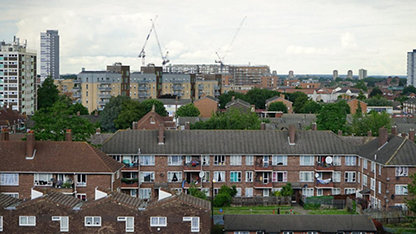I started as a graduate surveyor working for one of the UK’s top property consultancy firms in 2012. I was exposed to many areas of London real estate while I was there including high end residential. I was also able to do a placement in their Paris office where I covered high end French residential property as well as commercial and industrial properties. I qualified as MRICS in 2015 and in 2018 I set up my own consultancy firm focusing on community-led and affordable housing. I also took on a few non-executive director roles within the sector and currently sit on the Board of Directors for the Confederation of Co-operative Housing (CCH).
Michaela Bygrave is a Real Estate Development Consultant. She qualified as MRICS in 2015 and set up her own consultancy firm, Pointe Michel Ltd, in 2018, focusing on community-led and affordable housing. For our Spotlight series, we asked the dedicated professional to answer a few questions for us.
I work with community groups and affordable housing providers so at a hyperlocal level. I only work on schemes that will add social value e.g., housing developments that are built around a sense of community or which provide employment and training opportunities or support for the formally homeless or those with addictions or for households priced out of the mainstream market. Our ethos is around being socially responsible and putting that into the advice we give our clients. I want to see development and urban regeneration as something which empowers local people rather than replace them with people on higher incomes.
As a profession we still have a long way to go but in the last year I have seen more people willing to accept that changes are needed and start having those conversations. I see this as a positive change as you can’t fix a problem that you don’t believe exists. I think that the pandemic has helped many firms to embrace flexible working which will help to make property more inclusive than previously and help with the retention of staff. Property is a truly global and diverse profession and I think clients are getting less and less tolerant of firms that don’t reflect this.
The RICS has a big role to play in this. The RICS should reflect the diversity and inclusion that they want to see in the profession. It’s not enough to leave it to firms, some of whom are very small and cannot afford Diversity and Inclusion officers. Advice, training, and resources should be offered to all those in the profession as part of the member offering. However, at a firm level many HR departments are themselves not diverse or inclusive enough to deal with the concerns of staff members who don’t fit the standard company mould so companies should look more closely at this too.
I am proud to make decisions that influence how we all live and improves lives for the better. I feel proud when I work on a housing development at feasibility stage and then see it be built and being enjoyed by residents. I feel like I have become part of that developments story and history.
I am also proud to be in an industry where people are trying to address the adverse environmental affects that construction has. I have had the opportunity to work with people coming up with great solutions which will address construction waste and energy savings in buildings.
















